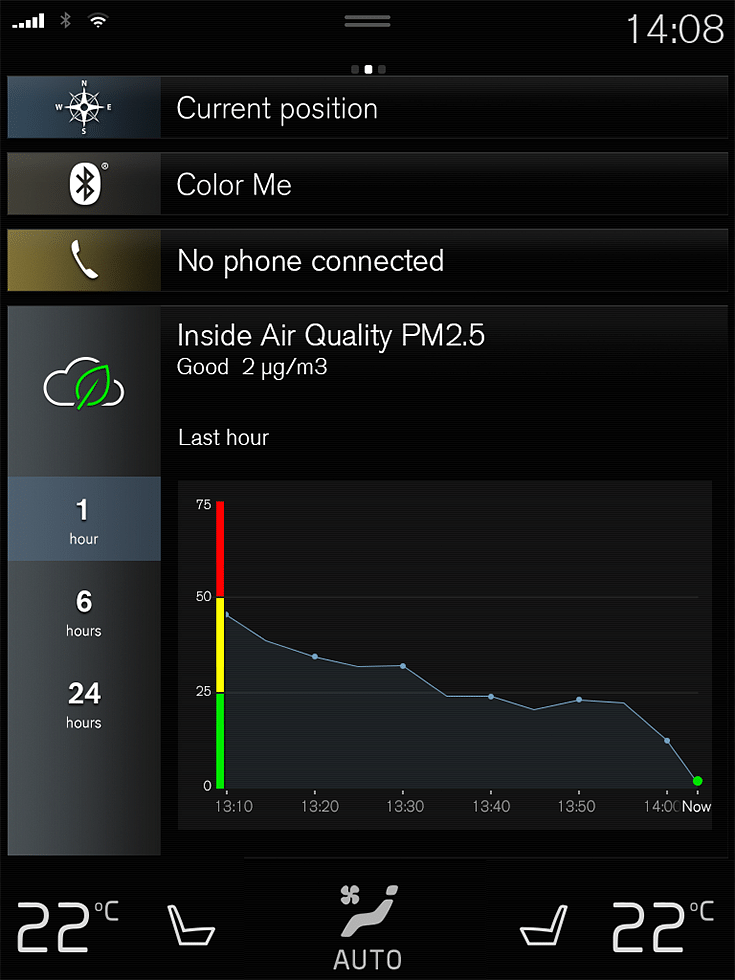Volvo reveals world-first cabin air quality technology
New Advanced Air Cleaner technology comes with a sensor that measures PM 2.5 levels inside the cabin
Volvo Cars has introduced a world-first premium air quality technology in its cars, allowing drivers to breathe clean and healthy air inside their cars and clean the air of their cabin ahead of their journey.
The company’s new Advanced Air Cleaner technology comes with a sensor that measures PM 2.5 levels inside the cabin, creating a feature not available in any other car currently on the market.
In China, where PM 2.5 measurements and related information services are well-established, Volvo drivers can also compare air quality inside the cabin to that outside the car.
Indicating the amount of fine particulate matters in the air, PM 2.5 is a widely-used measure for air quality. Globally, many urban areas suffer from PM 2.5 values that exceed recommended levels by the World Health Organisation, underlining the need to minimise their impact.

Available on all 90 and 60 Series Volvo models based on the Scalable Product Architecture (SPA) since this spring, the Advanced Air Cleaner cleans out fine particulate matters from the cabin. Thanks to a synthetic fibre-based filter and ionisation, up to 95 per cent of all PM 2.5 particles are kept out of the cabin.
This optimises air quality inside the car, limiting the adverse health effects that are associated with air pollution and fine particulates. Cleaner air inside the car also helps to advance safe driving, as healthy and fresh air can help boost driver concentration.
Drivers of relevant Volvo models can also use the Volvo On Call smartphone app (where available) to easily schedule an extra cleaning of the cabin air ahead of their journey. The app then tells drivers about the actual PM2.5 levels inside the cabin after cleaning.
“With our Advanced Air Cleaner technology, you can rest assured that the air you breathe inside your Volvo is cleaner and healthier,” said Anders Lofvendahl, senior technical expert on cabin air quality at Volvo Cars. “We believe that clean air is good for you, both from a health and from a safety perspective, and will continue to push the envelope in this area.”
Focus in other areas too
Apart from the Advanced Air Cleaner technology, Volvo Cars also works on creating a healthy environment inside its cars in other ways. Its engineers have a long-standing focus on removing emissions from organic substances in the car and minimising the amount of allergy-causing materials from its interiors.
Volvo Cars has strict sourcing requirements for suppliers in order to minimise the generation and emission of odours from parts and materials used inside the cabin. The company also works closely with a variety of universities and other institutes on projects related to material use, as well as developing and implementing ever stricter allergy standards for its interiors.
A special team of odour assessors, internally known as The Noses, tests components individually as well as on a complete car level for odour emissions. Despite technological advances, this team remains unmissable for the odour control process as the human nose is much more sensitive than any analytical instrument.
RELATED ARTICLES
Autoliv Plans JV for Advanced Safety Electronics With China’s HSAE
The new joint venture, which is to be located strategically near Shanghai and close to several existing Autoliv sites in...
JLR to Restart Production Over a Month After September Hacking
Manufacturing operations at the Tata Group-owned British luxury car and SUV manufacturer were shut down following a cybe...
BYD UK Sales Jump 880% in September to 11,271 units
Sales record sets the UK apart as the largest international market for BYD outside of China for the first time. The Seal...






 By Autocar Professional Bureau
By Autocar Professional Bureau
 17 Sep 2020
17 Sep 2020
 8981 Views
8981 Views





 Ajit Dalvi
Ajit Dalvi




